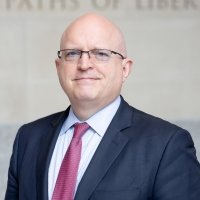The Working Group on the Western Balkans: Setting an Agenda for Transatlantic Cooperation
The EU and the US agree that the long-term goal for the Western Balkans is European integration. For a variety of reasons, however, progress on this goal has stalled. This series aims at launching a discussion on the hurdles to enlargement in the Western Balkans, the tools available to various international actors in the region, and how these resources might best be applied to reach the goal of integration most efficiently. These meetings, therefore, address issues that are at the core of the making the Transatlantic relationship work.
The special focus of this meeting will be on agenda setting. With the current crisis in the Eurozone, it is understandable that Western Balkan accession will not be a top priority. Nevertheless, the Enlargement DG, the US Department of State as well as the foreign ministries of EU member states, along with other international actors will obviously continue to work on the region. In this environment, when leadership will be distracted by other concerns, it is more important than ever that policy on the region be coordinated, and a joint agenda may help keep this process on track.
During the discussion, we hope to identify policy elements that might be integrated into a joint EU-US agenda for the region. Working group policy briefs have suggested various policy changes and innovations. It remains unclear, however, how these ideas might be incorporated into the international policy agenda, how the labor will be divided among different actors, or if other issues have since become priorities.
9:45 Coffee
10:00am Meeting begins; Welcome and Introduction by Nida Gelazis, Senior Associate, European Studies
What is on the policy agenda in the EU and US for the Western Balkans? How might EU and US coordination be improved?
Brief presentations:
Ambassador Philip Reeker, Deputy Assistant Secretary for European and Eurasian Affairs, U.S. Department of State
Rory Domm, EU Delegation
Ambassador Kurt Volker, Center for Transatlantic Relations, Johns Hopkins SAIS
12:00 Lunch
1:00 What are the elements of a successful transatlantic agenda? How have issues such as civil society engagement been brought into the agenda, and have these efforts been successful? What issues are not currently addressed by the EU-US agenda? How can we work to keep local politicians from coopting the international agenda in ways that delay or distract from the goal of EU accession?
Introduction to the topic:
Ivana Howard, National Endowment for Democracy
Dimitar Bechev, European Council on Foreign Relations
Ivan Vejvoda, German Marshall Fund
3:00 Meeting ends
Participants:
David Armitage
National Intelligence Council
Dimitar Bechev
European Council on Foreign Relations
Robert Benjamin
National Democratic Institute
Ina Breuer
Project on Justice in Times of Transition
David Bosco
American University
Ambassador Srdjan Darmanovic
Embassy of Montenegro
Rory Domm
EU Delegation
Ambassador Cynthia Efird
Helsinki Commission
Kellee Farmer
Department of State
Nida Gelazis
Wilson Center
Gisella Gori
EU Delegation
Michael Haltzel
Johns Hopkins SAIS
Robert Hand
Helsinki Commission
Michael Henning
USAID
Bruce Hitchner
Tufts University
Ivana Howard
National Endowment for Democracy
Lise Morje Howard
United States Institute of Peace
Harris Mylonas
Harvard University
James O’Brien
Albright Stonebridge Group
Jonas Rolett
Soros Foundation
Ambassador Philip Reeker
Department of State
Cynthia Romero
Atlantic Council
Clelia Rontoyanni
World Bank
Christian Sadat
German Embassy
Daniel Serwer
Johns Hopkins, SAIS
Jason Steinbaum
House Committee on Foreign Relations
Ivan Vejvoda
German Marshall Fund
Ambassador Kurt Volker
Johns Hopkins SAIS
Peter Zernite
Department of State
Speakers


Albright Stonebridge Group, Department of State (ret.)

Hosted By

Global Europe Program
The Global Europe Program is focused on Europe’s capabilities, and how it engages on critical global issues. We investigate European approaches to critical global issues. We examine Europe’s relations with Russia and Eurasia, China and the Indo-Pacific, the Middle East and Africa. Our initiatives include “Ukraine in Europe”—an examination of what it will take to make Ukraine’s European future a reality. But we also examine the role of NATO, the European Union and the OSCE, Europe’s energy security, transatlantic trade disputes, and challenges to democracy. The Global Europe Program’s staff, scholars-in-residence, and Global Fellows participate in seminars, policy study groups, and international conferences to provide analytical recommendations to policy makers and the media. Read more
